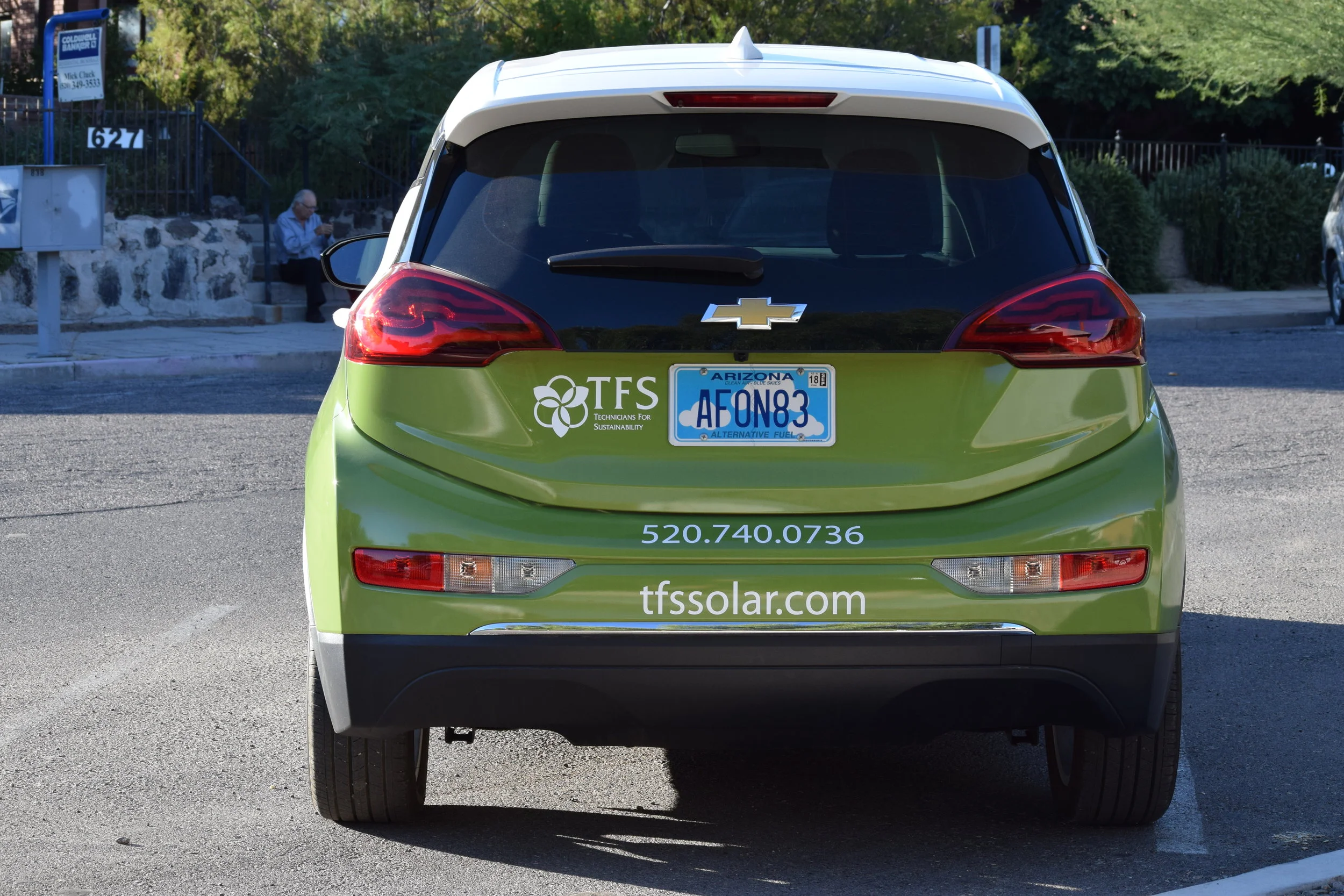A Practical Alternative to Fueling Up
Since adding a second EV to the TFS fleet this year with the Chevy Bolt, we have been spending a lot more time thinking about the overall experience of going electric on the road, and how current technology is making the switch more seamless than ever.
Why Electric Vehicles (EV)?
Addressing climate change is an integral part of why TFS is here - we are constantly asking what can TFS do to push farther toward a solution? What can we do as individuals and a community? In the US, over a quarter of all greenhouse gas emissions are from transportation.
Although the principal product of our work at TFS, installing solar panels, reduces our collective carbon emissions, we are also focused on reducing the emissions caused by our operations. In pursuit of this goal, TFS has integrated hybrid and all-electric vehicles to our fleet over the last 8 years, and we recently purchased an all-electric, solar-powered Chevy Bolt.
Why is now the time for EV's?
For TFS, the exploration of more sustainable transportation started years ago. Having used alternative fuel vehicles as part of our company fleet since 2005, TFS has recognized from the onset the need to address our transportation in order to transition to a clean, renewable energy based economy.
In the early years, we used biodiesel from recycled grease and oil, as fuel for our diesel vehicle, as well as a variety of electric assist bike options for our operations. As we grew, these became less practical and we began to use Toyota Tacoma trucks; the most fuel efficient truck we could buy at the time, averaging a 20% fuel efficiency increase over other trucks.
We've also had a fleet of Toyota Prius (Priuses, Prii, Priem) over the years, and generally found the Prius to be a great car, but sluggish to drive and ultimately still gas-based (our staff reported that the Prius doesn't exactly have the most exhilarating driving performance).
We also added an all-electric Nissan Leaf in 2010, and having charged it off of our solar energy system, have been pleased with it's ability to transport us carbon free for almost 8 years. As early adopters of an electric vehicle, we were both delighted with its ability to transport us “gas free”, and acutely aware of the Leaf's range limitations, especially on a few memorable trips back from Green Valley. It's incredibly fun to drive, though, shedding any sluggishness of the hybrids and adding in the pleasure of instant and smooth acceleration.
Why Electric Vehicles (EV)?
Addressing climate change is an integral part of why TFS is here - we are constantly asking what can TFS do to push farther toward a solution? What can we do as individuals and a community? In the US, over a quarter of all greenhouse gas emissions are from transportation.
Although the principal product of our work at TFS, installing solar panels, reduces our collective carbon emissions, we are also focused on reducing the emissions caused by our operations. In pursuit of this goal, TFS has integrated hybrid and all-electric vehicles to our fleet over the last 8 years, and we recently purchased an all-electric, solar-powered Chevy Bolt.
Why is now the time for EV's?
For TFS, the exploration of more sustainable transportation started years ago. Having used alternative fuel vehicles as part of our company fleet since 2005, TFS has recognized from the onset the need to address our transportation in order to transition to a clean, renewable energy based economy.
In the early years, we used biodiesel from recycled grease and oil, as fuel for our diesel vehicle, as well as a variety of electric assist bike options for our operations. As we grew, these became less practical and we began to use Toyota Tacoma trucks; the most fuel efficient truck we could buy at the time, averaging a 20% fuel efficiency increase over other trucks.
We've also had a fleet of Toyota Prius (Priuses, Prii, Priem) over the years, and generally found the Prius to be a great car, but sluggish to drive and ultimately still gas-based (our staff reported that the Prius doesn't exactly have the most exhilarating driving performance).
We also added an all-electric Nissan Leaf in 2010, and having charged it off of our solar energy system, have been pleased with it's ability to transport us carbon free for almost 8 years. As early adopters of an electric vehicle, we were both delighted with its ability to transport us “gas free”, and acutely aware of the Leaf's range limitations, especially on a few memorable trips back from Green Valley. It's incredibly fun to drive, though, shedding any sluggishness of the hybrids and adding in the pleasure of instant and smooth acceleration.
Stay Tuned
This is part two of our EV blog series. If you missed out on the first entry, detailing our experiences with the Chevy Bolt, you can find it here. Stay tuned next week for our final EV series blog, all about charging.
This is part two of our EV blog series. If you missed out on the first entry, detailing our experiences with the Chevy Bolt, you can find it here. Stay tuned next week for our final EV series blog, all about charging.


